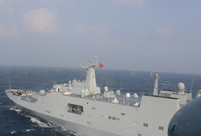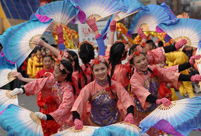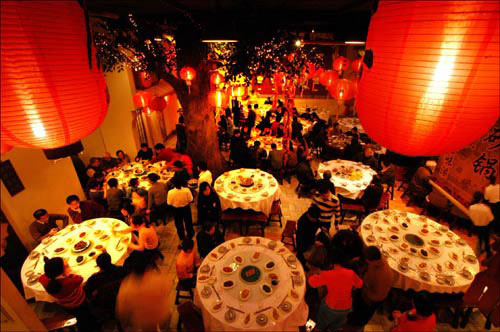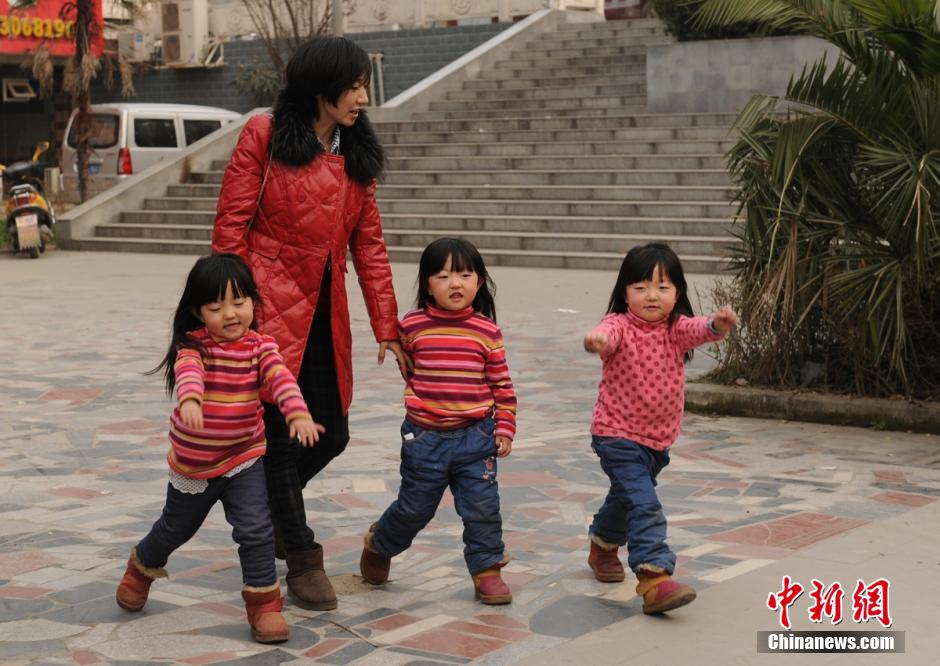 Turnip sculptures amaze tourists in Qingdao
Turnip sculptures amaze tourists in Qingdao Chinese ship formation conducts live fire training in West Pacific
Chinese ship formation conducts live fire training in West Pacific
 China comes in third at figure skating team event
China comes in third at figure skating team event
 China's teenager skater Yan shines at his Olympic debut
China's teenager skater Yan shines at his Olympic debut
 Taiwan-born actor stars on US TV series
Taiwan-born actor stars on US TV series
 Chinese Lunar New Year gift from abroad
Chinese Lunar New Year gift from abroad Chinese champions of Winter Olympic Games
Chinese champions of Winter Olympic Games  Zhang Yimou fined 7.48 mln for over-production
Zhang Yimou fined 7.48 mln for over-production
 Top 10 timeless female Chinese stars
Top 10 timeless female Chinese stars
It was a winter wonderland in resplendent display. Snowy features in crystalline glitters gave ways to colorful gigantic balloons in the shapes of the famous "onion heads" characteristic of Russian Orthodox churches, punctuated by phantasmagoric sets of fireworks.
In a sense, the Winter Olympics opening ceremony at Sochi could be likened to a coming-of-age rite for a confident modern Russia, having trudged through its share of growing pains since the late 20th century.
The grand event was perhaps rendered even more meaningful by the attendance of Chinese President Xi Jinping. For two years in a row since he took up the reins of leadership, Xi has made Russia his first overseas destination, and Sochi his first international sporting-event visit. These positive gestures no doubt testified to the high degree of importance attached by the Chinese side to a revitalized Sino-Russian relationship, and are reciprocated by the warm hospitality extended by the host, Russian President Vladimir Putin.
The cultural ties between the two sides have been long-lasting. More than a generation of Chinese children, for example, grew up having learnt to sing Russian folk songs, such as the popular "Moscow Nights." In his recent interview with Rossiya TV, Xi fondly recalled having read the works of no fewer than 11 Russian authors.
The close rapport between China and Russia demonstrates to the rest of the world that it is possible for major world powers to coexist peacefully and harmoniously.
There is nothing intrinsically inevitable about the solid Sino-Russian links. As China rises inexorably to assume its proper role on the world stage and as Russia readjusts its superpower status, the two neighbors could have slid down the slippery slope into the abyss of icy confrontation.
But instead, like cross-country skiers, the two partners decided to hold on to each other by sheer will, tremendous hard work and a generous dose of mutual admiration.
This is in stark contrast to some other major powers that prefer to welcome China's emergence not with open arms, but with stiff eyebrows of suspicion and frosty attempts to thwart.
The close working relationships between China and Russia in global and regional issues also contribute to peace and security in many parts of the world. This is perhaps most vividly demonstrated by both countries' active participations in the Shanghai Cooperation Organization to bring about stability and prosperity in what would otherwise be a rather turbulent part of the world.
The frequent diplomatic acts in concert with each other serve as counterweights to some other more domineering major powers and give vent to alternative views on world affairs.
They made possible a multipolar global community of sovereign nations to thrive closely together as in curling, instead of a unipolar dominance of the world scene by a prima donna figure skater.
Yet the cozy ties between China and Russia could still be deepened with care and determination. In the same Rossiya TV interview, Xi spoke at length on the experience and lessons of China's arduous but ultimately fruitful process of reform and opening-up, in addition to the good prospects for Russia and China to further join hands in the future.
This sort of "prosper thy neighbor" mentality is in the best interest of the two countries.
An associated call could perhaps be made for China and Russia to raise their bilateral trade figures. China-Russian trade has yet to catch up with even China-Malaysian trade.
The intended trade growth should also be comprehensive, not only encompassing large-scale State-owned enterprises, but also placing special emphasis on trading between small and medium-sized enterprises in both countries. As the volume and depth of trade bloom, the overall ties between countries and peoples typically blossom as well.
This can start at Sochi, a balmy Black Sea port reputedly the only city north of the Tropic of Cancer with a subtropical climate. As new friendships are forged and old ones renewed, China and Russia look set to scale new Olympian heights in their mutual ties.
The author is a senior fellow with the S. Rajaratnam School of International Studies, Nanyang Technological University, Singapore.
 Special Coverage: Sochi Winter Olympic Games
Special Coverage: Sochi Winter Olympic Games  A day of a female high-speed train chief attendant
A day of a female high-speed train chief attendant New Year greetings from Chinese nationals in Africa
New Year greetings from Chinese nationals in Africa PLA navy conducts landing drills in South China Sea
PLA navy conducts landing drills in South China Sea  Blind date fair in Hangzhou
Blind date fair in Hangzhou  Highlights of Chinese New Year celebrations around the world
Highlights of Chinese New Year celebrations around the world  How do the Chinese spend their money during Spring Festival?
How do the Chinese spend their money during Spring Festival? 'Milk Tea' girl hosts Spring Festival gala of universities in U.S.
'Milk Tea' girl hosts Spring Festival gala of universities in U.S.  Brave mother fights cancer, enjoys Spring Festival with her triplets
Brave mother fights cancer, enjoys Spring Festival with her triplets President Xi attends opening ceremony of Sochi Winter Olympics
President Xi attends opening ceremony of Sochi Winter Olympics Highlights of opening ceremony of Sochi Winter Olympic Games
Highlights of opening ceremony of Sochi Winter Olympic Games Snowscape in Chinese New Year
Snowscape in Chinese New Year Interesting horse figures in life
Interesting horse figures in life  Top 20 most beautiful Chinese stars
Top 20 most beautiful Chinese stars  Top 10 Chinese films in 2013
Top 10 Chinese films in 2013Day|Week|Month